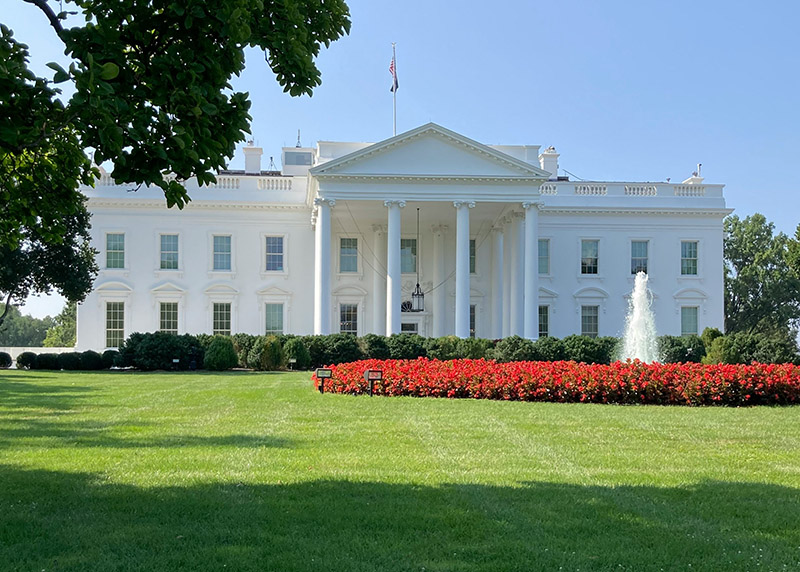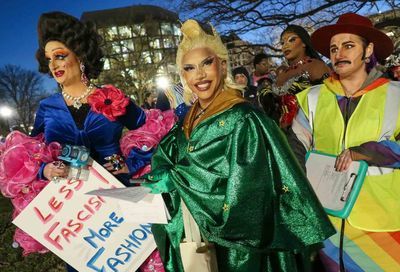Pentagon issues new guidance allowing transgender troops to serve
Guidance reverse Trump-era policies, allowing qualified trans individuals to serve and access gender-affirming health care.

On Wednesday, the U.S. Department of Defense issued new guidance that will allow transgender individuals to serve openly in the U.S. military and ensure they can access gender-affirming care and other benefits to which they’re entitled.
Under the new guidance, transgender people who meet all other military standards, including those for mental and physical health, will be allowed to enlist and serve in their self-identified gender. The guidance also prohibits discrimination within the military based on a service member’s gender identity.
The release of the guidance coincides with International Transgender Day of Visibility, which celebrates the accomplishments and achievements of transgender individuals and calls attention to the barriers to equality that they continue to face. It also comes on the heels of a two-month Pentagon review looking at developing guidelines for transgender service members.
The new policy reverses what was effectively a ban on transgender service members — save a few “grandfathered” service members who had already transitioned under the Obama administration’s “open service” policy — pushed by former President Trump and former Defense Secretary Jim Mattis. Under that policy, transgender individuals could only serve if they remained in, and adhered to grooming standards based on, their assigned sex at birth, had not been diagnosed with gender dysphoria, and did not seek out gender-affirming care.
In a mid-afternoon briefing, Pentagon Press Secretary John Kirby noted that, upon taking office, President Joe Biden issued two executive orders: one, prohibiting discrimination on the basis of sexual orientation and gender identity; and the second, allowing all qualified Americans to serve their country in uniform, thereby repealing the Trump ban.
In response to those orders, the Department of Defense issued interim guidance, which blocked any ongoing attempts to discharge or separate transgender individuals from the military, and called for a review of troops who had been separated, discharged, or denied the chance to re-enlist under the Trump administration’s policy.
Defense Secretary Lloyd Austin subsequently ordered the Pentagon to conduct a two-month review and finalize regulations governing transgender service members’ ability to serve, access health care, as well as determine any special accommodations they might need. Those regulations, which mirror the Obama-era “open service” policy, were finally released on Wednesday. The various branches of the military will have 30 days to roll out and implement the Pentagon’s newest policy, with the January interim guidance staying in effect until then.
As of 2019, LGBTQ advocates estimated that there were approximately 14,700 troops on active duty and in the reserves identifying as transgender. However, only 2200 service members have been diagnosed with gender dysphoria and are currently seeking gender-affirming care, Stephanie Miller, the director of the Defense Department’s Office for Diversity, Equity, and Inclusion, told reporters at the Pentagon press briefing.
Related: Transgender service members react to repeal of Trump military ban
Asked about the cost of providing gender-affirming care to transgender service members, Miller noted that it would not be particularly burdensome.
“The medical data that we have indicates that it’s very small, a handful of a million dollars per year, which is covered within the defense health budget of several billion,” Miler said. “So we’re not anticipating with these changes in policies that there’s going to be a significant impact in terms of medical costs.”
Miller’s claim aligns with the findings of a 2015 study published in the New England Journal of Medicine, which estimated cost of providing hormone therapy or surgery for transgender service members would be about $5.6 million each year, or “little more than a rounding error in the military’s $47.8 billion health care budget,” according to the report’s authors.
LGBTQ activists and advocates for open military service cheered the Pentagon’s new guidance.
“We have consistently said that restoring a policy of full inclusion for transgender troops would be straightforward, and the Biden administration has now done that, just as it promised from the start. This is a big step toward making our military stronger and fairer, and it recognizes years of research showing that a single standard for all service members improves readiness and allows for the widest possible pool of qualified personnel,” said Aaron Belkin, director of the Palm Center, a think tank that has long advocated for open military service and has issued several studies and reports on the effect of LGBTQ inclusion in the military.
One of those reports, co-authored by three former military surgeons general, assessed the impact of the Trump-era ban and found that the prohibition on transgender service members “compromis[ed] recruitment, reputation, retention, unit cohesion, morale, medical care, and good order and discipline.” That finding runs counter to claims made by anti-LGBTQ opponents that the presence of transgender individuals would somehow hamper military readiness or negatively affect unit cohesion.

Nic Talbott, an aspiring service member who has challenged the Trump ban on transgender service, cheered the new guidance as a positive development, bringing him one step closer to being able to enlist, which he was previously prohibited from doing.
“I look forward to seeing the military’s core values of fairness and respect reflected in a clear policy that welcomes all people who are qualified and willing to serve, and I’m more confident than ever that when I apply to enlist, I will be judged on my skills and my accomplishments, instead of my transgender status, which has nothing to do with my ability to serve,” Talbott said in a statement.
Two groups representing Talbott in his lawsuit, the National Center for Lesbian Rights and GLBTQ Legal Advocates and Defenders, also cheered the new guidance.
“With this new set of regulations, the military is putting an end to an ugly and shameful chapter in our nation’s history and once again embracing our nation’s highest ideals of equal opportunity for all,” Shannon Minter, the legal director at NCLR, said in a statement. “The new policies recognize the contributions of transgender service members and will increase the strength and stability of our armed forces. Increasing troops’ access to gender-affirming medical care will help transgender service members focus on their work, so they can do the best they can at their job, instead of having to worry about red tape stopping them from getting the health care they need.”
“With this policy, the Pentagon is setting a clear example for our federal government when it comes to fairness and equal opportunity,” Jennifer Levi, the director of GLAD’s Transgender Rights Project, added. “These policy changes are an important step toward strengthening the military. Of course, we still need comprehensive federal nondiscrimination protections like the Equality Act so that transgender service members are able to live with freedom and dignity whether in uniform or in civilian life.”
SPART*A, the nation’s leading transgender military service organization, praised the Pentagon’s latest move for providing “much-needed clarity” to the transgender service members the organization represents, who will now know what criteria they must meet to serve.
“We applaud this step to ensure the Department of Defense provides inclusive policy to attract and retain the best and brightest our nation has to offer,” Bree Fram, the vice president of SPART*A and a lieutenant colonel in the U.S. Air Force, said in a statement. “Military personnel reach maximum effectiveness when they have access to all medically necessary care, and we are excited that this policy extends that access to transgender service members. Additionally, opening recruitment to transgender individuals ensures an extremely talented and motivated pool of people that this country needs have the opportunity to serve in uniform.”
The LGBTQ media advocacy organization GLAAD, praised the Biden administration’s quick and timely efforts to reverse the Trump-era policy.
“President Biden and the Pentagon have moved swiftly and certainly to undo the discriminatory and unjust transgender military ban put in place by the former President,” Sarah Kate Ellis, the president and CEO of GLAAD, said in a statement. “This is a great day for America’s service members, who deserve a commander-in-chief who understands the service and sacrifice that come with putting on the uniform of the United States military. This will make our military more ready, more cohesive, and more equal.”
Read more:
LGBTQ students from faith-based colleges sue Education Department for discrimination
South Dakota governor signs anti-trans executive orders after ban on trans athletes fails
Arkansas lawmakers pass bill criminalizing gender-affirming health care for trans youth
Support Metro Weekly’s Journalism
These are challenging times for news organizations. And yet it’s crucial we stay active and provide vital resources and information to both our local readers and the world. So won’t you please take a moment and consider supporting Metro Weekly with a membership? For as little as $5 a month, you can help ensure Metro Weekly magazine and MetroWeekly.com remain free, viable resources as we provide the best, most diverse, culturally-resonant LGBTQ coverage in both the D.C. region and around the world. Memberships come with exclusive perks and discounts, your own personal digital delivery of each week’s magazine (and an archive), access to our Member's Lounge when it launches this fall, and exclusive members-only items like Metro Weekly Membership Mugs and Tote Bags! Check out all our membership levels here and please join us today!























You must be logged in to post a comment.